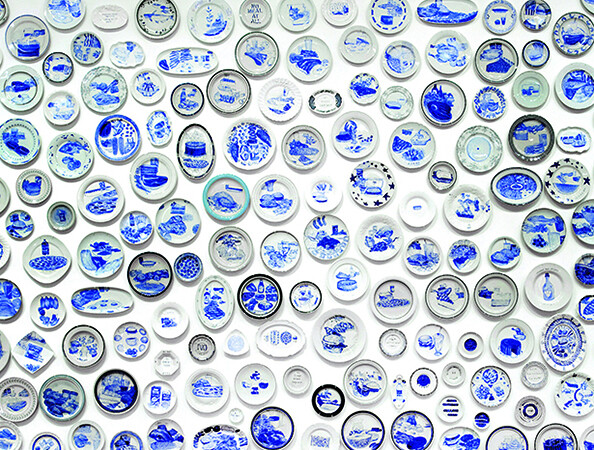May 9–August 9, 2015
Opening day program: Saturday, May 9, 2pm
Mary and Leigh Block Museum of Art
Northwestern University
40 Arts Circle Drive
Evanston, IL 60208
www.blockmuseum.northwestern.edu
The Mary and Leigh Block Museum of Art at Northwestern University presents The Last Supper: 600 Plates Illustrating Final Meals of U.S. Death Row Inmates, an installation by artist Julie Green, from May 9 through August 9, 2015.
This exhibition features 600 white ceramic plates painted with cobalt blue mineral pigment to depict U.S. death row inmates’ last meal requests. Julie Green, professor of art at Oregon State University, has been painting these plates for 15 years and is committed to creating 50 each year until capital punishment is abolished.
Every plate in The Last Supper is accompanied by a description of the meal request, date and state—but no more. Without naming the inmate or crime, the meals highlight the human dimension of capital punishment and the criminal justice system. They function as anonymous portraits that when grouped together suggest a memorial to lost life on a mass scale.
The Last Supper has particular resonance at Northwestern University, given that its School of Law played a key role in eradicating the Illinois death penalty. The Block is partnering with the School of Law on dynamic programs that offer audiences varying perspectives, time to reflect, and space for dialogue around capital punishment—one of the most complicated, emotionally and politically charged topics of our time.
Funding for The Last Supper has been generously provided by Chicago artist Angela Lustig and Northwestern alumnus Dale E. Taylor. Taylor is the president and CEO of AbelsonTaylor.
Free spring programs for The Last Supper
Opening day program
Saturday, May 9, 2pm
Fisk Hall, 1845 Sheridan Road, room 217
The Block Museum welcomes Julie Green, who will present The Last Supper: 600 Plates Illustrating Final Meals of U.S. Death Row Inmates. She will discuss her process and how the project relates to her larger artistic concerns. Following this talk, Green, Professor of Art at Oregon State University, will be joined in conversation by Rob Owen, Clinical Professor of Law at Northwestern, and Elliot Reichert, Curator of Special Projects at the Block, to discuss issues of representation, the criminal justice system, and social justice. The program begins at 2pm at Fisk Hall, with a reception to follow at the Block Museum. The museum is open from 10am to 5pm and parking is free.
“Seen from Inside: Perspectives on Capital Punishment”
Tuesday, May 19, 6pm
Block Museum
In partnership with the Center for Capital Defense and the Center on Wrongful Convictions at Northwestern University School of Law, the Block will host a series of acts exploring various perspectives on capital punishment—an exhibition overview by curator Elliot Reichert, a capital case closing argument enacted by a death penalty defense attorney, a conversation with a former prisoner exonerated from death row, and insights from a family member of a homicide victim.
“When You CAN’T Shake It Off”
Wednesday, May 27, 6pm
Block Museum
A cell phone camera captures the death of Eric Garner. White men toting assault rifles film confrontations with police officers over their right to openly carry firearms. A video of a cop lip-synching to Taylor Swift goes viral. Join Will Schmenner, Block Cinema guest curator, and Harvey Young, Northwestern University associate professor, as they discuss the role and use of social media in creating a national conversation about race, law, and the limits of police power. How does civil resistance operate in the Internet era?
About The Mary And Leigh Block Museum of Art
The Mary and Leigh Block Museum of Art is the fine art museum of Northwestern University. It serves the academic and cultural needs of the University and the Chicago-area community with thought-provoking exhibitions, a rich and diverse permanent collection, dynamic programs, and classic and contemporary film screenings at Block Cinema.
Celebrating its 35th anniversary in 2015, the Block is a dynamic, imaginative resource that uses art as a springboard to explore issues and ideas that matter to our lives today. It is free and open to all, and visitors are invited to participate in experiential learning opportunities that bridge the classroom and the world beyond the campus.



